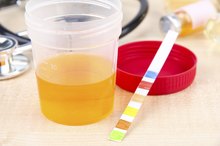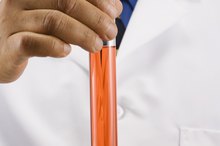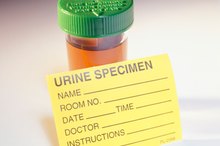Color of Urine Strips for Ketosis
Ketosis occurs when the body runs out of carbohydrates for energy. As a result, the body begins to process dietary and bodily fat to carry out necessary functions; the presence of ketones in urine thus indicates the metabolism of fat. Ketone testing strips evaluate the presence and concentration of ketones using a urine sample. Ketosis is evidenced by the a chemical reaction on the testing pad, which will change colors based on the concentration of ketones.
Presence of Ketones
The presence of ketones in urine may be surmised by a simple urinary test. Some test strips offer further evaluation of the presence of glucose, proteins or other material in urine. However, in testing for ketosis, strips need only to test for the presence of ketones.
Use of Test Strip
How to Read a Urinalysis
Learn More
Urinary ketone test strips (or reagent strips) are simple to use. The testing pad, on one end of the test strip, is exposed to urine; it can be passed through a urine stream or dipped into a urine specimen. The testing pad contains a chemical that reacts in the presence of ketones, changing color depending on concentration.
Ketone Readings
For utmost accuracy, ketone readings should be conducted exactly 15 seconds after exposure to urine. On the testing bottle will be a small selection of colored squares demonstrating (in ascending order) what colors the test pad will turn in the event that ketones are present.
Test Strip Readings
How to Interpret Dipstick Urinalysis Results
Learn More
Ketone test strips generally have five categories associated with ketone concentration in blood. A negative reading indicates no ketones are present in urine 1. Trace (5 mg/dL), small (15 mg/dL), moderate (40 mg/dL) and large (80 to 100-plus mg/dL) are the four positive ranges, indicated by a pale pink (trace) through deep burgundy (large) color on the test pad.
Accuracy
The testing pad may not necessarily accurately reflect the concentration of ketones in the urine. Various conditions--such as dehydration or dietary fluctuations--may alter the results of a urine reagent test. While ketosis is generally safe for a healthy individual, ketoacidosis may occur if ketones build up in a diabetic's system.
Related Articles
References
- Walgreens: Differences Among Urine Test Kits
- American Diabetes Association. DKA (ketoacidosis) & ketones.
- De boer AH, Hoppentocht M. Comment on: Inhaled antimicrobial therapy-Barriers to effective treatment, by J.Weers, Adv. Drug Deliv. Rev. (2014). Adv Drug Deliv Rev. 2015;85:e1-2. doi:10.1016/j.addr.2014.08.013
- Cleveland Clinic. Clean catch urine collection. February 2007.
- Urbain P, Bertz H. Monitoring for compliance with a ketogenic diet: what is the best time of day to test for urinary ketosis? Nutr Metab (Lond). 2016;13:77. doi:10.1186/s12986-016-0136-4
- American Diabetes Association. Checking for Ketones.
- U.S. Food and Drug Administration. The FDA warns against use of previously owned test strips or test strips not authorized for sale in the united states: FDA safety communication. Apr 8, 2019.
- Urbain P, Bertz H. Monitoring for compliance with a ketogenic diet: What is the best time of day to test for urinary ketosis? Nutrition & Metabolism. 2016;13(1). doi:10.1186/s12986-016-0136-4
Writer Bio
Leah Berkman has been writing professionally since 2001. She has been published in "Battleground: Science and Technology," a textbook about the sociological and philosophical issues of science. She holds a Bachelor of Science in science and technology studies from Rensselaer Polytechnic Institute and is pursuing a Master of Arts in Russian and eastern European studies and a Master of Library Science from Indiana University.








